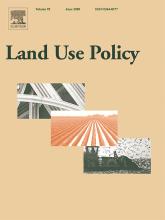Resource information
The demand for additional agricultural land is expected to rise by approximately 50 per cent by 2050 on a global level, and agricultural land of high quality needs to be preserved to ensure future food security. However, agricultural land per capita is decreasing. One of the main reasons for this in the EU and globally is the building of houses or infrastructure on agricultural land. There is a possibility that the Swedish agricultural sector will grow in the future and supply more regions than its own territory with food due to, e.g., climate change. Although appropriate regulations exist to support local decision makers in protecting agricultural land in Sweden, the potential to provide such protection is not fully utilised. This paper aims to contribute to explaining why Swedish municipalities build on agricultural land through an analysis of the values behind the arguments for preserving and exploiting agricultural land at the municipal level and the implications of these values for the preservation of agricultural land in Sweden. Assuming value pluralism, we analyse 30 municipal comprehensive plans through a framework of nine realms of value. We find that municipalities deploy at least eight of the nine realms of value to motivate the preservation of agricultural land, but the economic realm is more dominant among arguments to exploit agricultural land. Most plans do not consider food security. Municipalities could become better prepared to handle unexpected events if they worked with longer-term future scenarios. Further research is needed regarding how different values are weighed against each other in actual exploitation issues.


